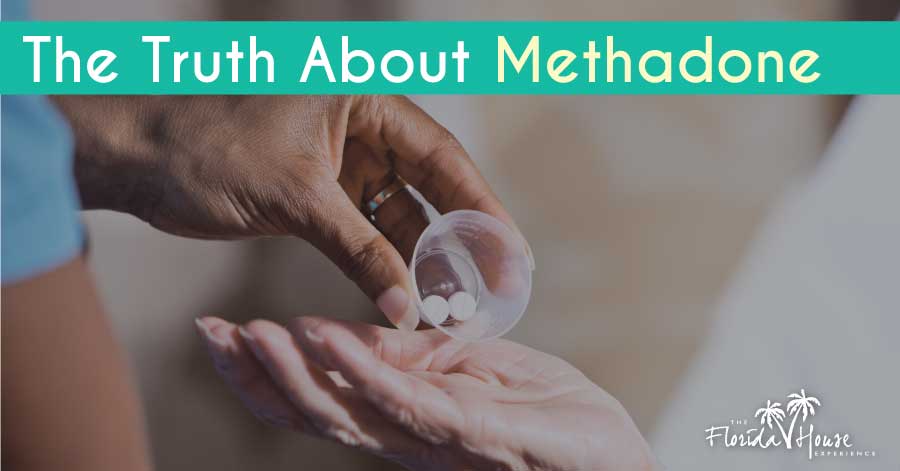
Methadone is a highly contested pharmaceutical medication typically prescribed for moderate to severe pain but made popular for its use in assisting with the treatment of opioid addiction. Because methadone acts on the same opioid receptors as morphine and heroin, many detox and addiction treatment centers elect to utilize it as a means of assisting patients to navigate the initial stages of opioid withdrawal.
While it may appear to make some sense in this application, many providers and recovering addicts themselves have found that more often than not, the initial addiction is transferred to the methadone and merely prolongs the addiction itself under the guise of a prescribed treatment plan.
Is Methadone a Viable Treatment Method for Opioid Addiction?
Methadone has become a popularized form of treatment for opioid addiction. The theory behind it lies in its formula which is designed to block the pleasurable sensations of other opiates but still offers the necessary relief for the addicted person to successfully navigate the pains of withdrawal.

There are a number of considerations that should be taken into account when assessing if methadone treatment is appropriate for a patient:
- Methadone is Highly Addictive – Methadone is a Federally Designated Schedule II substance because it is deemed to have a legitimate use, but also a very high probability of ongoing dependence as a result of its prescription. While the drug is formulated to block the pleasurable sensations of other opiates, the reality of it is it still offers a level of high that provides for some semblance of release to the addicted person. As a result, those who embody an addictive personality find themselves still actively pursuing the high they desire and abuse methadone in an attempt to achieve that goal. While it is solely meant to be used on a short-term basis to assist in withdrawing from opioids such as heroin, often times we have found individuals obtaining prescriptions for months or even years on end. It is for this reason many drug treatment programs have elected to move away from methadone to other alternatives including Suboxone®.
- Methadone Does Not Address the Root Cause of Addiction – Methadone itself is meant to assist in subsiding the most difficult stage of initial recovery – withdrawal. It is during the withdrawal stage that most addicted individuals tend to discharge from treatment programs against medical advice (AMA) in order to obtain various forms of opioids including pain pills and heroin to resume their addictive behaviors. Methadone is thus meant to serve as a temporary relief effort for those withdrawal pains to help the addicted individual successfully navigate this difficult stage in order to learn and practice the skills and behaviors necessary for long-term sobriety. In theory the medication should serve as a valuable addition to an individualized treatment program. However, since the root cause of the addiction has not been addressed (i.e. the mental obsession), methadone merely becomes a substitute. The addicted individuals mind still yearns for the high, specifically to the level other opioids were able to help it achieve, and results in a high probability of abuse in an attempt to achieve that goal. So long as this mental obsession remains, very few pharmaceutical alternatives can successfully get the patient to the mental stage they need to be to achieve lasting sobriety. Extremes can be found similarly with alcoholics who abuse mouthwash, or other addicted persons that huff various inhalants or additional creative household cocktails to escape the pain.
- Methadone is a Short-Term Option at Best – Once a patient has successfully navigated the initial withdrawal pains at the onset of recovery, methadone should no longer be integrated into that individual’s treatment plan. As mentioned earlier, the root cause of addiction is not addressed, and the use of methadone now only serves to prolong the addictive behavior. Additionally, the prescribed use of methadone should be limited to detox centers overseen by trusted medical professionals. The destructive reality of its highly addictive nature has been repeatedly exploited by “pain clinics” capitalizing off its stigma as an opioid treatment medication to write long-term prescriptions to addicted patients. To combat this, significant research has been conducted into alternative pharmaceutical and natural options to achieve similar objectives with more successful results. Some pharmaceutical alternatives include Suboxone®, Vivitrol or Zubsolv. In other cases, treatment programs are now pursuing more natural remedies such as proper dietary support, liquids and yoga type exercises under medical observation to help provide the necessary comfort to make it through the difficult stages of withdrawal without the development or substitution of addictive substances.
Is Methadone Right for Me?
In our experience, there are many roads that lead to the same destination. The purpose of methadone is to provide short-term relief to an addicted person navigating the initial pains associated with withdrawal from an opioid addiction. If a patient can successfully break through the pains associated with withdrawal, they are significantly more likely to develop the proper skills and learn behaviors vital to sustainable long-term sobriety.
The predominant issue faced with methadone treatment is the high not satisfying what these addicted individuals are used to achieving through the use of opioids. As a result, many times methadone becomes a substitute substance and contribute to a significant amount of opioid-related overdoses on an annual basis. When the root cause of addiction is not addressed, the behavior remains the same and thus the cycle continues with a transference to a different substance.
While a number of alternatives including Suboxone®, Vivitrol, and Zubsolv have grown in popularity for their ability to achieve the same objective with fewer setbacks, many treatment programs are vying for more natural remedies to assist clients through the withdrawal process. This includes ongoing medical observation as proper diet, liquid consumption and appropriate physical exercise such as yoga are incorporated into the individual’s treatment program in order to navigate the pain but come out the other side without a newfound addiction to a substitute substance.






